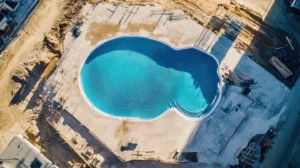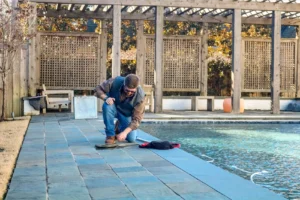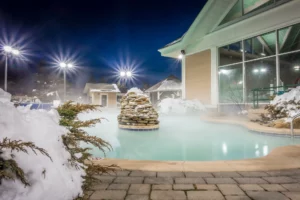A swimming pool is a wonderful feature to have in your backyard, but maintaining it requires vigilance. One of the most concerning problems pool owners face is leaks. Left unaddressed, a pool leak can lead to water loss, higher utility bills, and costly repairs. Recognizing the signs early is crucial to avoid further damage. Here are five common indicators that your pool may have a leak:
1. Unexplained Water Loss Could Mean A Swimming Pool Leak
While some water loss due to evaporation is normal, excessive water loss is a red flag. If you’re refilling your pool more than once a week, it could indicate a leak. A quick way to confirm is by performing the bucket test:
- Fill a bucket with water and place it on the pool steps.
- Mark the water level inside the bucket and the pool’s water level on the outside.
- Wait 24 hours.
If the pool water level drops significantly more than the bucket, you likely have a leak. Evaporation rates can vary depending on weather conditions, but a loss of more than 1/4 inch per day is considered excessive and warrants further investigation.
Additionally, it’s important to monitor water levels over time. Even small, gradual changes can signal a developing issue. Consistently observing your pool’s behavior will give you valuable insight into whether water loss is normal or problematic.
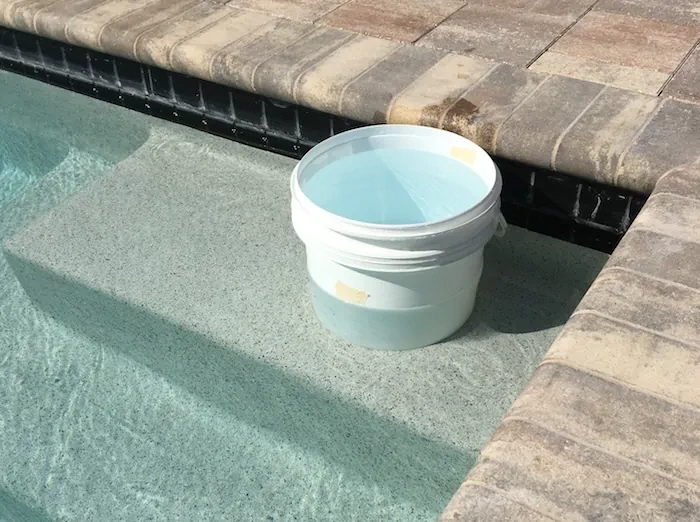
2. Increased Water Bills Could Mean You Have A Pool Leak
A sudden spike in your water bill without a clear explanation may signal a pool leak. This is especially true if you’re consistently adding water to your pool. Monitoring your water usage over time can help you detect unusual increases.
Leaking pools can waste thousands of gallons of water annually, causing a noticeable jump in your utility bills. For homeowners with automated pool refill systems, leaks can go unnoticed for longer periods. The refill system may continuously add water, masking the problem while driving up costs. If you’re unsure whether your system is contributing to the issue, consider turning off the automatic refill temporarily to observe water levels.
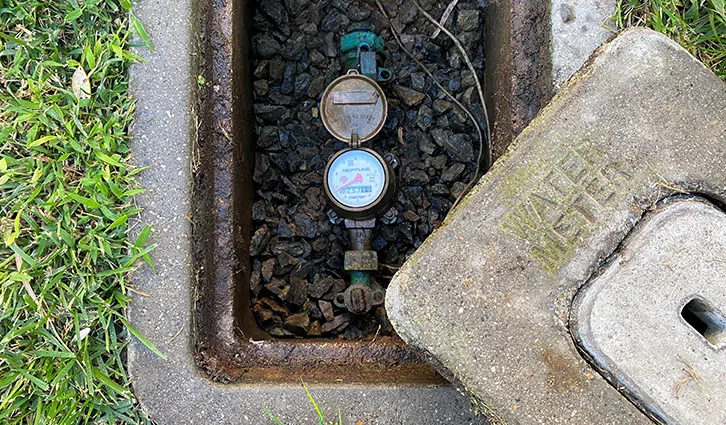
3. Wet Spots or Water Accumulation Around the Pool
If you notice soggy spots, puddles, or areas of standing water around your pool, it could mean water is escaping underground. These wet areas may also attract insects or result in soil erosion, which can damage your pool’s foundation.
Soil erosion can lead to significant structural problems over time. The displaced soil creates voids that may cause the pool deck to shift or crack. Poolside landscaping may also suffer, as excessive water can drown plants or create a breeding ground for mosquitoes and other pests. Regularly inspect the area surrounding your pool for any signs of abnormal moisture, especially after periods of heavy rainfall when leaks might be harder to distinguish.
In some cases, underground leaks may cause shifts in the ground that are not immediately visible. Over time, these shifts can compromise the integrity of your pool’s plumbing system, leading to even more extensive repairs. Hiring a professional to perform a leak detection test can help locate hidden issues early.
4. Cracks in the Pool Structure or Decking Could Mean You Have A Pool Leak
Cracks in your pool’s shell, tiles, or surrounding decking might be more than a cosmetic issue—they could be evidence of a leak. These cracks can worsen over time, especially if water continues to escape, so addressing them promptly is vital.
Structural cracks often appear as a result of shifting ground or improper installation. Over time, even small cracks can grow, allowing water to seep through. This water can erode the underlying soil or weaken the pool’s structure further. Visible cracks should be treated as a warning sign and repaired immediately to prevent further complications.
In addition to visual inspections, listen for unusual sounds like hissing or gurgling near plumbing fixtures, as these can indicate pressurized water escaping through cracks or breaks in the system. Regularly scheduled maintenance and inspections can help catch these issues before they escalate.
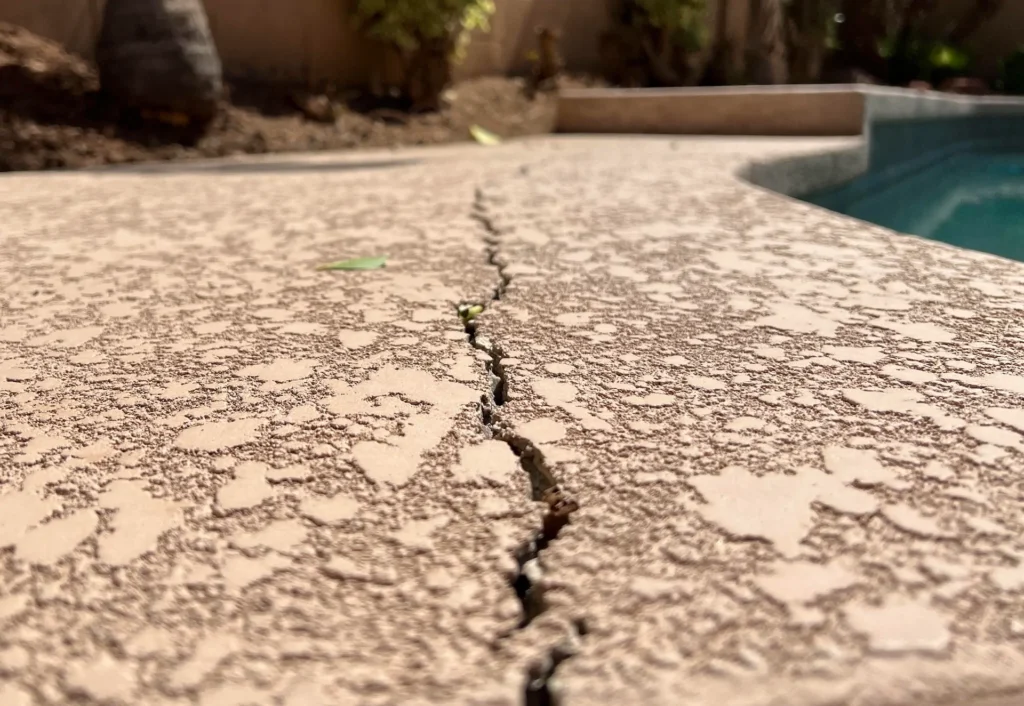
5. Fluctuations in Pool Chemicals
Are you finding it harder to maintain proper chemical balance in your pool? A leak can dilute your pool’s water, throwing off chemical levels and making it difficult to stabilize pH, chlorine, and alkalinity. This can result in cloudy water and increased maintenance.
Chemical imbalances caused by leaks can lead to several problems, including algae growth and bacteria accumulation. As water leaks out and fresh water enters, the delicate chemical balance required to keep your pool safe and clean is disrupted. This not only increases maintenance efforts but also the cost of chemicals as you attempt to restore balance.
If you’ve noticed your pool water becoming cloudy or developing an unusual odor despite regular maintenance, it’s worth investigating further. Cloudy water can also signal more severe issues, such as leaks in the filtration system. Consult with a pool professional to determine whether a leak is contributing to your chemical fluctuations.
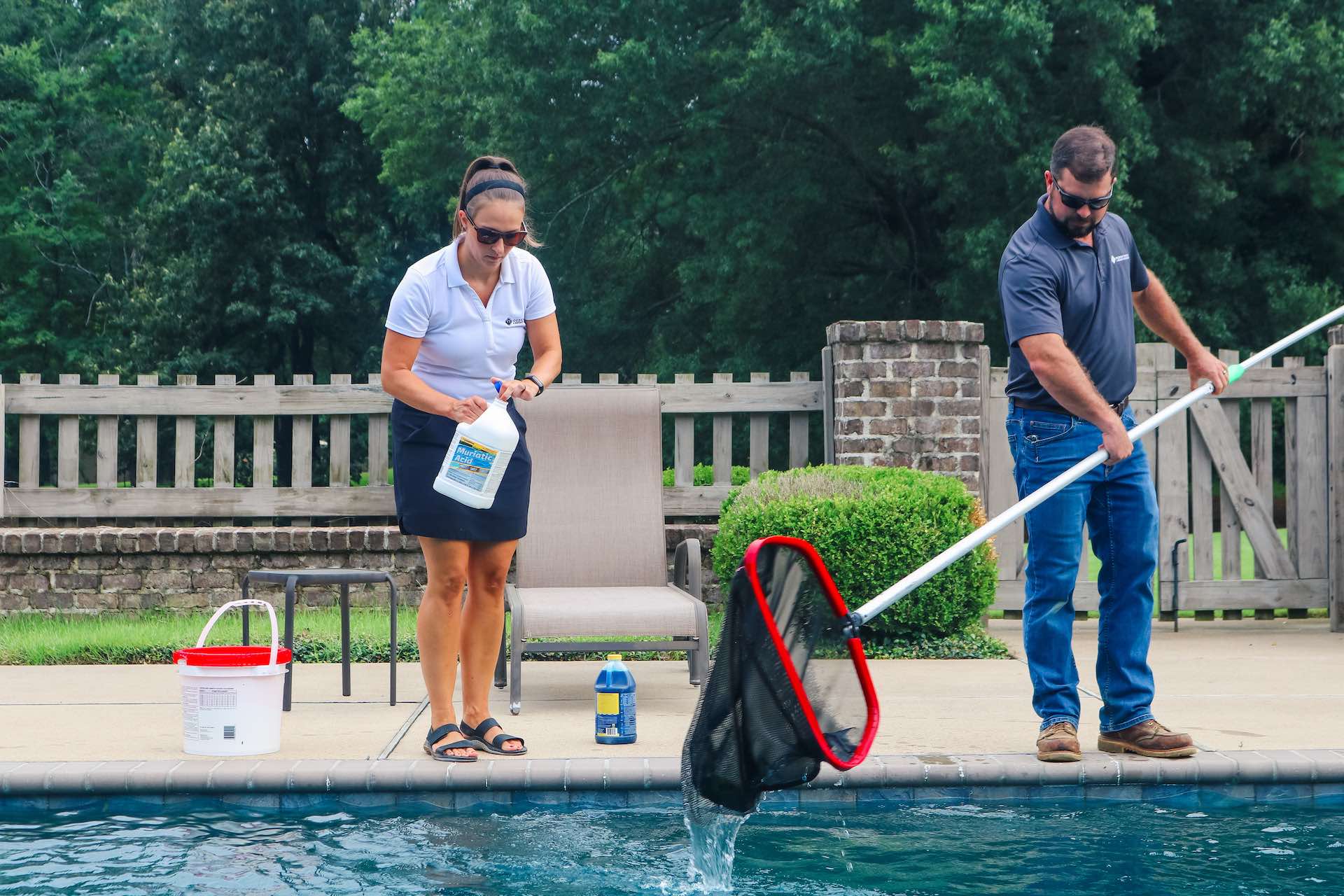
Additional Signs to Watch For Around Swimming Pool Leaks:
While these five signs are the most common indicators of a pool leak, other subtle clues may also hint at a problem. For example:
1. Air Bubbles in the Pool Could Mean A Swimming Pool Leak
Air bubbles coming out of the return lines could indicate that the pump is drawing in air due to a leak in the suction side of the plumbing.
2. Unusually Warm Pool Water Can Signal A Swimming Pool Leak
If your pool water is warmer than usual, it could mean water is escaping and your heater is working overtime to compensate for the loss.
3. Decreased Pump Performance Is A Symptom Of A Swimming Pool Leak
A leak can reduce water pressure in the system, causing the pump to struggle or operate less efficiently.
4. Sand and Dirt Is Most Likely A Swimming Pool Leak
While this is rare, if you see sand or dirt entering your pool from the jets or your skimmer, you most likely have a leak of some kind.
What Should You Do If You Suspect You Have A Swimming Pool Leak?
If you’ve noticed any of these signs, it’s important to act quickly. A professional pool service like Ogden Pools in Memphis, TN, can perform a thorough leak detection test using advanced tools to pinpoint the issue. Attempting to fix a pool leak on your own can lead to more damage and higher repair costs, so leaving it to the experts is always the safest option.
Professional leak detection services often use specialized equipment like pressure testing, dye testing, and electronic listening devices to locate the source of the problem accurately. These methods minimize disruption to your pool and property while ensuring the leak is resolved efficiently.
Learn More About Our Swimming Pool Leak Detection Services. You can schedule a consultation today OR give us a call at (901) 794-4764
How Can You Prevent Pool Leaks In The Future?
Once a leak has been repaired, taking preventive measures can help avoid future issues. Regular pool maintenance, including inspections of plumbing and structural components, is essential. Properly winterizing your pool during colder months can also protect it from freeze-related damage. If you’re unsure about the best practices for maintaining your pool, consulting with a professional can provide valuable guidance.
Conclusion
Detecting a pool leak early can save you time, money, and stress. By keeping an eye out for unexplained water loss, wet spots, or changes in your pool’s chemical levels, you can address potential leaks before they escalate. Additionally, understanding the less obvious signs, such as air bubbles or reduced pump performance, can help you catch problems early. If you’re in the Greater Memphis area and need help, contact us for reliable leak detection and repair services. With our expertise, you can enjoy a safe, leak-free pool for years to come.
